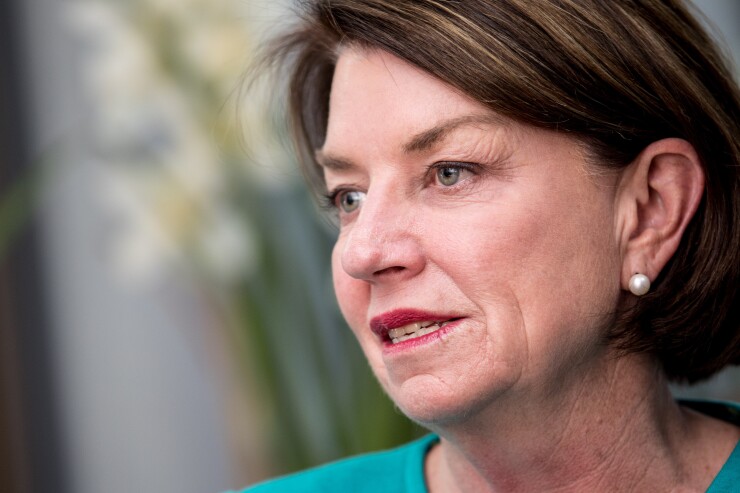The Commonwealth Bank of Australia money-laundering scandal has damaged the public's perception of the whole banking sector, according to the head of the industry's lobby group.
"The issue that Australian banks are suffering with is community trust and public reputation," Australian Bankers' Association Chief Executive Officer Anna Bligh said in an interview on Monday. "The events of the past week, 10 days, have not only been very serious and damaging for the reputation of the Commonwealth Bank but for the banking industry in Australia as a whole," she said.
The nation's biggest lender has been engulfed by claims it breached anti-money-laundering laws more than 50,000 times. On Monday, it said Chief Executive Officer Ian Narev will leave the bank within 10 months.

Australian banks, battered by a series of scandals, have been attempting to head off opposition party calls for a wide-ranging inquiry into the sector, and fight back against the government's decision to hit them with a A$6.2 billion ($4.9 billion) levy.
"Australians do see the banking sector as an industry, and when something happens in one bank, it inevitably has some roll-on effect," Bligh said.
Her stance was echoed by Australia & New Zealand Banking Group Ltd. Chief Executive Officer Shayne Elliott.
"This is not something we can fix overnight," Elliott said in an internal interview posted on ANZ's website. While the industry is united in wanting to put the scandals behind it and is acting to address issues such as pay structures, "it's going to take a number of years actually, that's how trust is re-earned," he said.
Giving a timetable for Narev's departure will provide "certainty for the business" Commonwealth Bank Chairman Catherine Livingstone said on Monday, while batting away questions as to the link between his retirement and the allegations facing the lender. The bank has said it will file a defense to the money-laundering claims and that a coding error — which has now been fixed — accounted for many of the breaches.
While Narev has delivered a record profit during each of his almost six years in charge, his tenure has been overshadowed by three major public-relations scandals, the latest being the money-laundering allegations.
"We do have a sense at CBA that for some time now it has been profit at all cost," Australian Shareholders' Association Chief Executive Officer Judith Fox said Tuesday in a Bloomberg TV interview. "They need to address the culture issues. There has been one scandal after another," she said.
Adding to Commonwealth Bank's woes, the securities regulator said Monday the bank will refund about A$10 million to more than 65,000 customers for selling them unsuitable insurance on products such as credit cards and car loans. The bank also announced that an internal review of pension payments found it had underpaid 36,000 current and former employees by about A$16.7 million.
The Labor opposition have used the money-laundering claims to step up its calls for a wide-ranging public inquiry into the banks — known as a Royal Commission.
Bligh said that while the banks "don't fear scrutiny," a Royal Commission would "inevitably slow" the changes underway, citing "the very, very committed reform program that every Australian bank is currently implementing." Those include a shake-up in remuneration practices, new codes of conduct, and better protection for whistleblowers, she said.
"You can't communicate your way out of a reputational problem like this," Bligh said. "There is only one way to do that: do the hard yards and make the changes necessary."





